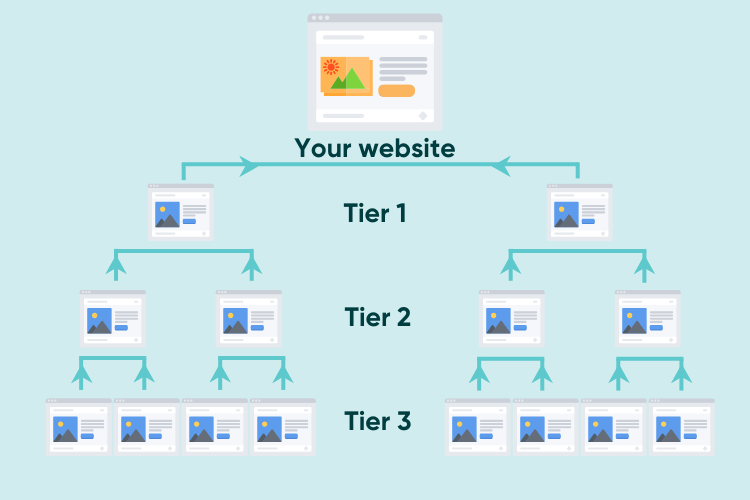Our Links Are Trusted By 2,500+ SEO Agencies
Our Links Are Trusted By 2,500+ SEO Agencies
By the Rhino Rank team
25th Mar 2024

If you want to enhance your SEO approach, increase your search engine rankings, and attract more organic website visits, then tiered link building could be the answer.
In this article, we will have a closer look at how effective tiered linking is as an SEO tactic – going over its advantages and disadvantages, the different ways you can carry out tiered link building, and if it’s the right solution for your business.
Tiered link building is all about creating backlinks for your backlinks.
Link building utilizing a tiered method can provide more power and send increased link juice to the most important pages on your website. These pages are often referred to as “money pages”, as they are the pages on your website that generate the most conversions and revenue.
It is crucial to be aware of potential risks associated with a tiered link building structure, as it is possible to receive penalties from search engines if there are too many low-quality second-tier links or if you create an unnatural-looking backlink profile. But don’t worry, we will go into this in more detail shortly.

Tiered link building is typically split into three different layers.
By combining these tiered backlinks, website owners can drive more authority and link power to their website, which will help to improve their keyword rankings and overall Search Engine Optimization (SEO) performance.
A tiered link building framework is a way of increasing website authority and improving search engine rankings through the transfer of ‘link juice’. The SEO value that’s passed on to the targeted site comes from the backlinks used, with aspects such as domain authority, relevancy between links, and impact on user experience all impacting how successful this flow across the different tiers will be.
With proper link building management, this tactic can enhance the targeted websites’ overall authority and result in greater organic traffic numbers over time. A key element when implementing a tiered link building campaign strategy like this is making sure it is properly managed, as poor quality link building can negatively impact your SEO performance.
For a successful tiered link building approach, careful preparation and implementation are essential. The first step is to pick the most appropriate referring sites for your first-tier links, these should be sites that have the highest authority, relevancy, and overall SEO performance. When selecting the referring sites for your second-tier links and third-tier links, it is important to vary quality levels by utilizing both premium and more “average” sites to create a natural backlink profile that won’t raise alarm bells from search engines.
Selecting the appropriate target sites is fundamental for maximizing SEO results for a successful tiered link building strategy. It’s important to choose high authority and relevant websites that will transmit valuable link juice to your webpage. Trustworthy domain authority checkers such as Moz, Ahrefs, and Semrush can be used to assess the authority of a site.
The two most effective ways to build high authority first tier links are:
When building lower-tiered links, it is important to focus on both quality and quantity. This means you can focus on building links from slightly less authoritative sites than you did for the tier-one links, but not dropping your quality standards so low that you end up using black hat link building tactics, like utilizing link farms or Private Blog Networks (PBNs).
By striking the right balance between high quality links and more “average” links, you can replicate a natural and organic backlink profile – ensuring your link building efforts are met with enhanced website authority and improved ranking on SERPs.
There are numerous link building strategies out there including tiered link building, and depending on your link building methods tiered link building can either be viewed as a white hat or black hat SEO tactic.
White hat tiered link building is a safe and effective approach to enhancing website visibility and SEO performance. This link building method focuses on creating valuable content, and then securing endorsements and links from reputable third-party sites.
By prioritizing quality over quantity, white hat tiered link building abides by Google’s Webmaster Guidelines, meaning website owners can avoid the penalties associated with spammy and manipulative link building tactics. By following these guidelines, website owners can develop a comprehensive SEO strategy that not only boosts organic traffic but also improves search engine rankings, ensuring long-term SEO success.
The easiest way to obtain high quality links is to work with other webmasters to publish in-content links and regular guest posts. However, this can be a very time consuming process, so many businesses choose to partner with a reliable link building agency that offers backlink and guest post outreach services.
Black hat tiered link building involves using unethical tactics to artificially manipulate search engine rankings. Instead of creating valuable content, black hat strategies prioritize exploiting loopholes in search engine algorithms to artificially boost their online visibility.
Unlike white hat link building, this approach focuses on quantity over quality, often utilizing spammy techniques such as buying low-quality links, creating links using automation tools, or engaging in link schemes, like link farms and PBNs. These practices directly violate Google’s Webmaster Guidelines and can result in severe penalties, including websites seeing a drop in keyword rankings or being completely de-indexed from Google altogether.
Whilst it is possible to see some short-term SEO results from building black hat links, this approach can ultimately harm a website’s reputation and long-term success. Therefore, businesses need to avoid black hat tiered link building and instead focus on sustainable, ethical SEO practices if they want to achieve genuine, lasting results.
Tiered backlinks come with both risks and rewards.
Utilizing a successful tiered link building strategy can lead to improved SEO results. However, there are potential drawbacks such as receiving a search engine penalty for trying to secure “quick wins” by building an unnatural or low-quality backlink profile. To reduce these issues, it is important to adhere to Google’s Webmaster Guidelines, avoid spammy links, and prioritize creating natural quality connections when implementing backlinks.
By understanding the advantages along with any risks associated with building tiered links, you will be better equipped to make decisions on how best to optimize your overall link building strategy.
The top 4 benefits of building tiered links are:
The top 2 risks associated with building tiered links are:
To ensure your tiered link building strategy remains successful, it is important to continuously monitor and evaluate its progress. Utilizing tools such as Google Analytics and Ahrefs will enable you to gain insight into your organic growth and referral traffic development. By assessing this data, you can easily assess whether any improvements are needed for effective SEO results.
Suppose you want to take your tiered link building strategy to the next level. Adopting some of the advanced link building methods listed below will allow you to create a more natural connection between your backlinks and increase your website validity, which in turn helps improve search engine rankings.
Utilizing the right type of backlinks to build your tiered links will allow you to generate better SEO results, whilst ensuring you uphold the white hat method of link building and stay clear from penalties.
By focusing on user engagement and placing relevant hyperlinks in context-driven material, you can ensure the links you create add value and improve the user’s online experience – either by directing them to a product they are interested in, answering a question they have, or simply providing them with additional entertainment. This practice helps search engines determine how trustworthy your backlinks are, and the more positive interactions your website has, the more organic traffic Google will send your way.
Having a tiered link building strategy that is diversified across sources can help create an organic backlink profile which poses no risk of triggering any Google penalties caused by low quality and manipulative link building.
To achieve this, it’s important to receive links from high quality websites and industry directories as well as medium authority links from social media platforms and industry guest posting. By building a variety of links, you’re telling search engines that the website has genuine value, which will result in higher rankings.
Tiered link building can be an extremely effective SEO strategy. When you use a trusted tiered link building service, tiered links not only improve a site’s search engine visibility but also enhance its credibility and trustworthiness with users and search engines alike. All of which will help boost the site’s keyword rankings and organic traffic numbers.
Tiered link building is an SEO strategy that involves creating backlinks for your backlinks, which means in time more link juice and link authority is passed to your target website.
Yes! Tiered link building remains an effective way to build links with a strong backlink profile and increase website ranking. It takes advantage of how Google views and ranks websites and allows you to create the link equity you need to achieve better rankings.
First-tier links are the most authoritative links and point directly to your website. These links come from websites that have already amassed a high domain authority (DA) and are directly related to your products or services.
Second-tier links are medium authority links that point directly to the first-tier links. These links come from relevant and trustworthy websites, often in the form of press releases or blog posts.
Third-tier backlinks are some of the lowest authority links and point directly to the second-tier links. These links often come from social media channels, like Facebook and Linked, forums, and online directors or discussion boards.
Link juice, also known as link equity, is a powerful search engine ranking factor. In a tiered link building framework, link juice is passed from higher-tier links to the target web page, helping raise the target website’s ranking position while improving its overall authority.

Join 26,000+ Businesses Growing with Rhino Rank
Sign Up